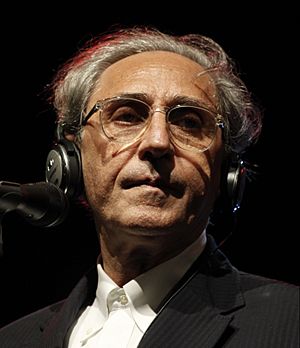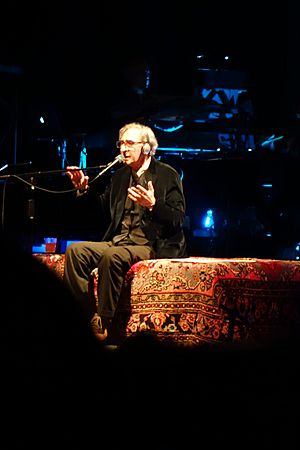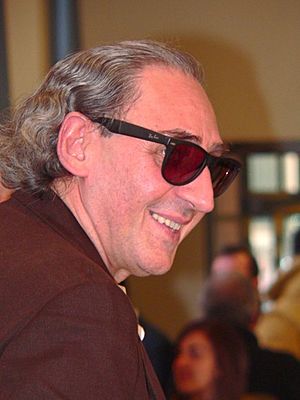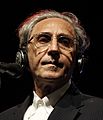Franco Battiato facts for kids
Quick facts for kids
Franco Battiato
|
|
|---|---|

Battiato performing at the Festival Gaber in Viareggio, 2010
|
|
| Background information | |
| Birth name | Francesco Battiato |
| Also known as | Süphan Barzani |
| Born | 23 March 1945 Ionia, Sicily, Italy |
| Died | 18 May 2021 (aged 76) Milo, Sicily, Italy |
| Genres |
|
| Occupation(s) |
|
| Instruments | |
| Years active | 1965–2019 |
| Labels |
|
| Associated acts |
|
Francesco "Franco" Battiato (born March 23, 1945 – died May 18, 2021) was a famous Italian musician. He was also a singer, composer, filmmaker, and painter. As a painter, he used the name Süphan Barzani.
Battiato's songs often explored deep topics. These included ideas about philosophy, religion, and mysterious themes. His music covered many styles. He made experimental pop, electronic music, progressive rock, and new wave. He also created opera and symphonic music.
For many years, he was one of Italy's most loved singer-songwriters. His unique sound and lyrics made him special. People called him "Il Maestro" (The Master). He worked with many Italian and international artists. One important collaboration was with the Italian singer Alice. They even represented Italy together in the Eurovision Song Contest 1984 with their song "I treni di Tozeur".
Contents
Biography
Early Years and Experimental Music
Franco Battiato was born in Ionia, Sicily, Italy. After finishing high school, he moved to Rome in 1964. Then, at age 19, he moved to Milan. Soon after, he got his first music contract.
His first single, "La Torre," was released. Battiato performed it on TV. He also had success with the romantic song È l'amore. He worked as a guitarist and sound engineer for other singers. Later, he toured America and found success there.
In 1970, Battiato met the experimental musician Juri Camisasca. He also worked with an Italian rock band called Osage Tribe. As a solo artist, he released a science-fiction song called La convenzione. This song became a classic in Italian progressive rock.
Starting in 1971, Battiato focused on experimental electronic music. He released several albums that were not well-known at the time. Today, collectors look for these albums. His music started as electronic progressive rock. Over time, it became more experimental. He used sounds from everyday life and simple, repeating musical patterns. His first album, Fetus, came out in 1972. Other albums followed, like Pollution (1973) and Clic (1974).
In 1975, he joined the Dischi Ricordi music label. He released albums like Battiato (1977) and Juke Box (1978). His experimental album it:L'Egitto prima delle sabbie (1978) even won an award for modern music.
Becoming a National Star
After leaving Ricordi, Battiato signed with EMI. He changed his music style. He moved from experimental rock to a more pop sound. This made him much more popular in Italy and worldwide. During this time, he often worked with the musician and violinist Giusto Pio.
His album L'era del cinghiale bianco (The Era of the White Boar, 1979) was a success. It reached the top 30 on the music charts. This album included songs like "Le Aquile" and "Prospettiva Nevskij." This period also marked the start of his work with singer Alice.
His next album, "La Voce del Padrone" (The Master's Voice), was even more successful. The songs were elegant and easy to listen to. This helped him gain many fans. "La Voce del Padrone" had many songs that became Italian classics. It stayed at number one for six months. It was the first Italian album to sell over one million copies in just one month.
His success continued with L'arca di Noè (Noah's Ark) in 1982. Songs like "Centro di gravità permanente" (1981) and "Voglio vederti danzare" (1982) made Battiato a huge star in Italy. In 1983, he released Orizzonti perduti (Lost Horizons). This was followed by Mondi Lontanissimi (Faraway Worlds, 1985). This album included a solo version of "I treni di Tozeur". He had performed this song as a duet with Alice at the 1984 Eurovision Song Contest.
In 1988, his album Fisiognomica sold over 300,000 copies. Battiato himself thought this was his best work. It included the hit song "Nomadi" (Nomads). This song was written by his old friend Juri Camisasca, who had joined a religious place. The album also had "E ti vengo a cercare," used in a movie. Another song, "Veni l'autunnu," had lyrics in Sicilian and Arabic languages.
Working with Manlio Sgalambro
In 1994, Battiato started working with the Sicilian philosopher Manlio Sgalambro. Sgalambro wrote most of the lyrics for Battiato's next albums. In 1996, they released L'imboscata. This album included the romantic hit "La cura" ("The care"), which was named the best Italian song of the year. They continued to make music together, always trying new sounds.
Later Projects
In 2003, Battiato released his first full-length movie, Perduto amor (Lost love). He also wrote the music for it. The movie won an award for the best new director. It was shown at important film festivals around the world. His next movie, Musikanten, was an experimental film about the composer Ludwig van Beethoven.
In November 2012, Battiato accepted a role in the Sicilian government. He became the regional Minister for Tourism and Culture. He said he would not take any salary for this job, but he later had to resign.
Final Years
In the 2010s, Battiato released a series of albums called Fleurs. These albums featured covers of songs by famous Italian, French, and English singers. They also included some new songs. He continued to release music that mixed pop, rock, and electronic sounds until 2010.
He toured with Alice in 2016. His last concert was in Catania in 2017. He wanted to continue making music, but he had to stop due to health reasons. At the end of 2019, his manager announced that Battiato was officially retiring from performing.
Franco Battiato was a vegetarian. He was interested in ideas of unity among different religions and beliefs.
Battiato passed away on May 18, 2021, at his home in Milo, Catania. For a while, the exact cause of his death was kept private, respecting his family's wishes. The following year, it was shared that he had been suffering from a serious illness for several years, diagnosed in 2017.
Discography

| Year | Title | Sales | Certifications |
|---|---|---|---|
| 1970 | "Fetus" |
|
|
| 1972 | "Pollution" | ||
| 1973 | "Sulle corde di Aries" | ||
| 1974 | "Clic" | ||
| 1975 | "M.elle le "Gladiator" | ||
| 1976 | "Feed Back (collection)" | ||
| 1977 | "Battiato" | ||
| 1977 | "Juke Box" | ||
| 1978 | "L'Egitto prima delle sabbie" | ||
| 1979 | "L'era del cinghiale bianco" |
|
|
| 1980 | "Patriots" |
|
|
| 1981 | "La voce del Padrone" |
|
|
| 1982 | "L'arca di Noè" |
|
|
| 1983 | "Orizzonti perduti" |
|
|
| 1985 | “Mondi lontanissimi” | ||
| 1985 | "Echoes of Sufi Dances" (in English) | ||
| 1985 | "Ecos de Danzas Sufi" (in Spanish) |
|
|
| 1986 | "Battiato" (collection) | ||
| 1987 | "Nomadas" |
|
|
| 1988 | "Fisiognomica" |
|
|
| 1989 | "Giubbe rosse" (live) | ||
| 1990 | "Una vita scellerata" (soundtrack) | ||
| 1991 | "Come un cammello in una grondaia" | ||
| 1993 | "Caffè de la Paix" | ||
| 1994 | "Unprotected" |
|
|
| 1996 | "Battiato Studio Collection" |
|
|
| 1996 | "L'ombrello e la macchina da cucire" | ||
| 1996 | "L'imboscata" |
|
|
| 1998 | "Gommalacca" |
|
|
| 1999 | "Fleurs" |
|
|
| 2000 | "La Cura" |
|
|
| 2000 | "Campi magnetici"(soundtrack) | ||
| 2001 | "Fierro battuto" | ||
| 2002 | "Fleurs 3" |
|
|
| 2003 | "Last Summer Dance"(live) | ||
| 2003 | "Last Summer Dance"(live) | ||
| 2004 | "Platinum Collection" |
|
|
| 2004 | "Dieci stratagemmi" | ||
| 2005 | "Un soffio al cuore di natura elettrica"(live) | ||
| 2008 | "Fleurs 2" |
|
|
| 2009 | "Inners Auge" |
|
|
| 2012 | "Apriti sesamo" |
|
|
| 2013 | "Del suo veloce volo" – with Antony and the Johnsons (live) |
|
|
| 2014 | "Joe Patti's Experimental Group" | ||
| 2015 | "Le nostre anime" (compilation) |
|
|
| 2016 | "Live in Roma" – with Alice (live) | ||
| 2019 | "Torneremo ancora" |
Singles
- 1965: L'amore è partito (Love's gone) – as Francesco Battiato
- 1965: E piu ti amo (The more I love you...) – as Francesco Battiato
- 1967: La torre / Le reazioni (The tower / The reaction)
- 1967: Triste come me / Il mondo va così (Sad like me / The world goes like this)
- 1968: È l'amore / Fumo di una sigaretta (It's love / Smoke of a cigarette)
- 1969: Bella ragazza / Occhi d'or (Beautiful girl / Golden eyes)
- 1969: Sembrava una serata come tante / Gente (It seemed it was an ordinary evening / People)
- 1971: Vento caldo / Marciapiede (Warm wind / Pavement) – recorded 1968
- 1972: Energia / Una cellula (Energy / A cell)
- 1972: La convenzione / Paranoia (The convention / ...)
- 1973: Love / Soldier – as Springfield
- 1978: Adieu / San Marco – as Astra
- 1979: L'era del cinghiale bianco / Luna indiana (The era of the white boar / Indian moon)
- 1981: Bandiera bianca / Summer on a Solitary Beach (White flag / ...)
- 1984: I treni di Tozeur / Le biciclette di Forlì (The trains of Tozeur / The bicycles of Forlì) – with Alice
- 1985: No Time No Space / Il re del mondo (... / The king of the world)
- 1985: Via Lattea / L'animale (Milky Way / The animal)
- 1996: Strani giorni (Strange days)
- 1996: Strani giorni (Remix)
- 1997: La cura (The cure)
- 1997: Di passaggio (Passing by)
- 1998: Shock in My Town
- 1998: Il ballo del potere (The Dance of Power)
- 2001: Running Against the Grain
- 2007: Il vuoto (The emptiness)
- 2007: Il vuoto (Stylophonic Remix)
- 2008: Tutto l'universo obbedisce all'amore (The entire universe obeys love)
- 2009: Inneres Auge
- 2012: Passacaglia
- 2013: Del suo veloce volo (Of its rapid flight) – with Antony and the Johnsons
Operas
- Genesi (1987)
- Gilgamesh (1992)
- Messa arcaica (1994)
- Il cavaliere dell'intelletto (1994) – unreleased
- Telesio (2011)
Filmography
- Perdutoamor (2003)
- Musikanten (2005)
- Nothing is as it seems (2007)
- La sua figura (2007)
- Auguri Don Gesualdo (2010)
- Attraversando il Bardo (2014)
Images for kids
See also
 In Spanish: Franco Battiato para niños
In Spanish: Franco Battiato para niños
 | Claudette Colvin |
 | Myrlie Evers-Williams |
 | Alberta Odell Jones |





